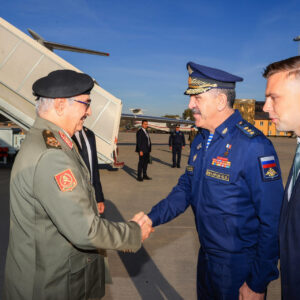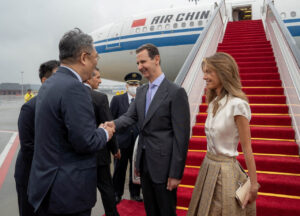
The National Interest Foundation Newsletter
Issue 209, October 6, 2023
Welcome to our NIF Newsletter. In this week’s analysis: We recap the dinner conversation with the former President of Tunisia, Dr. Mohamed Moncef Marzouki, critique the potential Saudi-Israeli normalization agreement, examine Libyan General Haftar’s visit to Moscow, explore the effects of the recent human rights report on torture in Egypt, analyze Bashar al-Assad’s recent visit to China, and look into the crisis in Nagorno-Karabakh.
NIF Event Recap

Dr. Marzouki is seen here answering a question. (Photo from NIF)
Dinner Conversation with Dr. Mohamed Moncef Marzouki, former President of Tunisia
By Jacob Van Veldhuizen
On Tuesday, September 26th, the National Interest Foundation had the honor of hosting the former President of Tunisia, Dr. Mohamad Moncef Marzouki, for a dinner conversation. The topic of discussion was the current status of Tunisia, what can be learned from the past, and the outlook of democracy in Tunisia.
Dr. Marzouki began the event by discussing his future outlook on democracy in Tunisia and North Africa. He began by saying that despite the current status of Tunisia, he remained confident in the people’s ability to persevere. He believes that though they have lost the immediate battle for democracy, the war will still be one. During their time as a democracy, Tunisians were proud to be Tunisian. The practice of torture was stopped. The people in Tunisia now have a recent example of democracy to compare to the current tyrannical government, allowing them to better understand the benefits of democracy. Marzouki went on to describe the main problem with the Arab Spring. He stated that external influences, especially from Gulf countries, allowed authoritarian rulers to regain power.
The former President ended the event by answering a round of questions from attendees. One attendee asked how Western governments could have and still can assist Tunisia in its quest for democracy. He described the disappointment he felt by the lack of support from Western governments during the Arab Spring. They refused to provide financial support or free up Tunisian funds. He emphasized the need for Tunisians to rely on themselves. He went on that the best thing these governments could do in the future is cut off support for authoritarian regimes globally. This would have multiple benefits, including cutting off funding, and political support, and sending a message to authoritarian countries around the world.
Dr. Marzouki closed the event by highlighting the importance of the younger generations to get involved in the fight for democracy. He encouraged them to get involved and remain as peaceful as possible. He ended the event by ensuring the attendees that there is still a will to reestablish democracy in Tunisia.
Saudi-Israeli Normalization

Secretary of State Antony Blinken has made multiple visit to Saudi Arabia to discuss the deal. (Photo from Reuters)
The Saudi-Israeli Deal and the Biden Administration’s Fiasco
By Jacob Van Veldhuizen
There has been a lot of news recently surrounding the ongoing normalization negotiations between Saudi Arabia and Israel. Most Western media outlets have covered the negotiations through a positive lens, but the stark reality is the harm that would come from such an agreement far outweighs the benefits. This is not because normalization between the two countries would be inherently bad, but because the conditions Saudi Arabia demands would destabilize the region and harm U.S. interests.
Saudi Arabia’s 3 core demands to normalize relations with Israel include the signing of a mutual defense contract between the United States and itself, the reopening of talks between Palestine and Israel, and that the United States supply Saudi Arabia with nuclear technology for “peaceful” purposes. Saudi Arabia can make these outlandish demands because it currently holds the most power in negotiations. They do not have the same sense of urgency as the other negotiating parties. One of the reasons the United States is currently escalating its campaign for normalization is that Biden desperately needs a foreign policy win to give him a boost in polling numbers before the upcoming 2024 elections. The administration does not currently have any major foreign policy achievements to boast. Israel would benefit from the deal because it would eliminate a number of perceived security threats. It would also be a much-needed political victory for Israeli Prime Minister Benjamin Netanyahu, who is also in a reasonably precarious political position. Saudi Arabia would also benefit economically and politically from normalization but is not under the same time constraints.
A mutual defense contract between the United States and Saudi Arabia would be a disaster. Not only does it undermine Biden’s broader foreign policy, but it also opens the door for all sorts of conflicts that the US could get forced into. This would escalate tensions in the region between Iran and Saudi Arabia. It would also give a major propaganda victory to China and Russia.
Giving nuclear technology to Saudi Arabia would be an incredibly dangerous path to go down as well. Though this would be subjected to close international supervision, it would be foolish to think that this technology would only be used for peaceful purposes. There is historical precedence. India acquired its nuclear weapons under the same pretenses. Saudi Arabia’s acquisition of nuclear weapons would increase the potential for a dangerous global conflict involving the likes of Russia, China, Iran, and North Korea. The US would almost certainly be dragged into this conflict. With so many actors involved, many of them armed with functional nuclear weapons, this conflict would also have a high probability of developing into a nuclear war.
Combining these two things would amount to an unacceptable risk of the United States being forced into another large conflict in the Middle East. Iran would not accept a nuclear-capable Saudi Arabia. If the deal were to be signed as is, it would halt any negotiations to revive the JCPOA and likely cause Iran to accelerate its nuclear program. Though Iran and Saudi Arabia have recently normalized relations, they can just as easily renege from this agreement.
It is also very likely that Mohammed bin Salman (MBS) will continue to draw these negotiations out to see the result of the 2024 elections. This may at least partially explain his It is well known that MBS and Biden are not fans of each other. In the past, Biden has made calls to make the crown prince a global pariah and has criticized him for the country’s poor human rights practices. The quasi-leader of Saudi Arabia doesn’t have a history of being a forgiving person. Bin-Salman will wait and see who wins the election and act accordingly from that point. If Trump wins, negotiations will likely proceed quickly to a deal. Trump has deep financial connections and a positive relationship with MBS, which will surely be exploited. If Biden wins, some type of normalization deal will still likely be passed, but right now it is more advantageous for the Saudi government to sit and wait and see the outcome of the 2024 presidential elections.
No matter the outcome of the election, the agreement is still not a sure thing. There are multiple outstanding issues that could still sink negotiations. One factor to consider is the diplomatic pressure from Iran. They have recently been putting out statements in strong opposition to any normalization between Israel and Saudi Arabia. Riyadh will have to weigh the pros and cons of normalizing with Israel at the cost of recent improvements with Iran. Another more important factor is Saudi Arabia’s demands concerning Palestine. Netanyahu is not likely to budge on this as if he makes any concessions, he will likely lose his position as prime minister. He depends on support from settlers to maintain his power. Agreeing to anything that would halt or otherwise obstruct the expansion of settlements would lose him this support. MBS has said that a solution to the Palestinian issue is necessary for a normalization agreement to be signed. It does remain to be seen if this will actually be a controlling factor in negotiations, as MBS has used the Palestinian issue to posture before.
This deal is simply not a good one. There are too many moving parts and even if those moving parts still somehow align, it is not a good option. it is a poor attempt to fix a problem by creating another one. It is not in American interests and would not lead to peace in the Middle. There is a way and will to normalize relations between Saudi Arabia and Israel, but this is not it.
Haftar’s Trip to Moscow

Haftar is seen here being greeted shortly after landing in Russia. (Photo from AFP)
Haftar in Moscow to Plot New Conspiracies
By Brenna Haggerty
On September 26th, it was announced that Khalifa Haftar, leader of the Libyan National Army (LNA), met with Russian officials in Moscow. Haftar met with President Vladimir Putin and Defense Minister Sergei Shoigu. A spokesperson for the Kremlin confirmed that they discussed “the situation in Libya and the region as a whole.” The LNA further commented saying the leaders discussed the current state of Libya, bilateral relations, and the strengthening of both countries. While this was the first meeting between Putin and Haftar since 2019, other recent meetings have taken place between the two governments. The first official visit of a Russian military delegation to North Africa was led by Russian Deputy Defense Minister Yunus-Bek Yevkurov on August 22, 2023. Most recently, on September 17th, Haftar met with Yevkurov in Benghazi after the deadly floods in Derna.
The Libyan National Army is a rival of the UN-backed government in Tripoli. The LNA relies heavily on the Russian mercenary Wagner Group for military support. Hafter used the Wagner Group for his failed attempt to take the capital in Tripoli back in 2019 and 2020. Despite resolutions from the United Nations Security Council requesting the withdrawal of all foreign military personnel from Libya, Wagner Group remains stationed in the east. Since the death of Wagner Group leader Yevgeny Prigozhin in August, the mercenary organization has gone through some restructuring, with Putin asking members to sign an oath of allegiance to the Russian state. On Friday, September 29th, Putin met with former Wagner Group commander Andrei Troshev to discuss the use of units in the Ukraine war. It is possible that Haftar’s visit to Moscow involved discussions of the Wagner Group’s continuing presence and support in Libya.
Since the floods in Derna last month, Libya’s struggle for a stable government has compounded. Protests broke out quickly after the flood, and Haftar has been using the disaster to strengthen his hold on Libya. Marshal Haftar’s son, Saddam Haftar, is in charge of all disaster aid and has been using this position to increase his international standing. Observers have said that instead of focusing on humanitarian relief, Haftar and his sons are using the disaster response to exert more control over the region. First responders were surrounded by troops from the Libyan National Army as they tried to provide essential aid. The LNA kept an “iron grip” on incoming assistance. Now, public access to Derna is closed, and the city has been deemed a disaster zone as citizens struggle without access to food, safe drinking water, and electricity.
Hafter and the LNA have been using their propaganda channels to appear in control of the situation in Libya, and Emadeddin Badi, an analyst with the Atlantic Council, called the meeting in Moscow a “PR stunt.” It is key that Haftar maintains his strongman reputation so he presents as a capable leader who can unite Libya. His crisis response invites criticism. Tim Eaton from Chatham House said that dissent will be a “political problem for Haftar” as he wants to showcase his security and stability. His recent visit to Russia helps strengthen him.
Moscow also benefits from their meeting. As Russia seeks to combat Western power, they have been leading a diplomatic effort in Africa. For years Russia has been isolated in global power politics and needs more allies. Since the onset of the war in Ukraine, their efforts have increased, spurred even further by the sanctions from the United States and the European Union. Libya makes sense as a diplomatic target; they have a friendly history and the potential to influence neighboring countries like Egypt and Sudan. Furthermore, a close allyship would be mutually beneficial, enhancing Russian influence and augmenting Haftar’s political strength in Libya. As Haftar uses the recent floods to control the country, a connection with Russia will highlight his potential as the future leader of a unified Libya.
Torture in Egypt

Growing unrest in Egypt is fueled by new scandals and a worsening economy. (Photo from Reuters)
Egypt Faces Renewed Human Rights Scrutiny
By Jacob Van Veldhuizen
Egypt has faced renewed scrutiny after a report tracking methods of torture used by Egyptian security forces was submitted to the United Nations Committee against Torture. It states the Egyptian authorities’ “use of torture is so widespread and systematic as to amount to a crime against humanity under customary international law.” Some of the methods used include beatings, electrical shocks, sexual violence, and denial of access to medical care. Torture is being used as a political tool to diminish dissent. The report was submitted by a coalition of NGOS including ECRF, the EIPR, and REDRESS.
This is not the first time Egypt has been criticized for its failure to respect human rights. These criticisms have increased as President Abdel Fattah al-Sisi continues his crackdown on dissent. It is estimated that there are some 60,000 political prisoners currently in Egypt. Previously, Egypt was able to pass of allegations of torture as isolated acts of misconduct, but this report shows that this is simply not true. Emergency and counter-terrorism laws passed by al-Sisi codifies torture into law. Another strategy often employed by Egypt to quell international criticism was to launch national dialogues, which had little real impact on policies. They have also released political prisoners in the past, but they are often quickly rearrested or quickly replaced by other dissidents. 1,000 prisoners have been released in the past year, but rights groups record at least 3 times that amount being detained. Despite the strong evidence. Cairo continues to deny these allegations.
These allegations come at an awkward time for Egypt, whose government was recently indicated in the corruption scandal involving Senator Bob Menedez. Menedez had previously used his power as Chairman of the Senate Foreign Relations Committee to ram through military aid for Egypt despite human rights concerns. Now his replacement, Senator Ben Cardin, has blocked at least $235 million in military aid to Egypt over human rights conditions. Despite this, it should still be noted that last month, the U.S. State Department approved $1.215 billion in military aid for the coming year. $85 million was also withheld. Losing military and political support from the United States would be a massive loss for Egypt, though if past actions are any indication, this is unlikely.
The upcoming election also comes at a poor time. The multiple scandals and allegations is likely to increase the amount of anti-el-Sisi protests. Many are already gaining momentum as the Egyptian economy continues to falter. Because elections and Egypt or neither free nor fair, it is still very likely that el-Sisi will win. Most of the opposition leaders have been arrested as to prevent them from running. He will need to suppress protests in order to do this. In the past, authorities have used brutal tactics to do so. These tactics are more difficult to hide from the international community, which will likely increase diplomatic and potentially economic pressure.
As el-Sisi continues to face a crumbling economy and growing scandals, he will likely have to employ more nefarious tactics to “win” the election. The little support el-Sisi had is slipping. Even pro-government voices have been warning of dire consequences if the economic and human situation does not improve soon. A former member of parliament, Ahmed el-Tantawy, has emerged as a potential challenger. It is unlikely that he will do well at the ballot box, as many of his supporters have already been arrested. The Egyptian security forces also have a history of preventing supporters of opposition figures to vote.
President Biden has repeatedly said that human rights are at the core of his foreign policy agenda and this is the perfect time to prove it. The United States must cut off all military aid. Egypt is an important strategic ally for the United States, but this behavior should not be tolerated, especially from allies. This is a mistake that the U.S. has made in the past with Iran. This mistake continues to have great impact on foreign policy decisions. History has shown us again and again that abusive authoritarian regimes are not stable. This is the perfect time for the United States to finally do the right thing and cut off support for Egypt.
Assad’s Goals with China

Assad gained a political victory but did not gain the financial support he desired. (Photo from Reuters)
Assad’s Visit to China Fails to Achieve His Main Goal
By Loretta Wolchko
Syrian President Bashar Al-Assad recently visited China to attend at the annual Asian Games. His visit in late September was his first to China in almost two decades, with the last visit occurring in 2004. It is widely speculated that this visit by al-Assad is a diplomatic attempt at securing friendships and funds for his regime from Xi Jinping. This endeavor takes place amid the civil war that has torn apart Syria and claimed half a million lives over the last decade. This visit comes only a few months after Syria was fully reinstated as a member of the Arab League after its suspension twelve years ago – right when the war began.
Assad and his wife landed at Hangzhou International Airport greeted by cheering children handing them bouquets as they walked a red carpet. He would later attend the opening games in Hangzhou with Xi to discuss long-term cooperation economically, politically, etc. Other political leaders in the region were also in attendance, but Assad had the most to gain and lose from his attendance and correspondence with Xi.
It was anticipated that Assad would emphasize the need for financial support during this time. The Syrian president’s visit comes amid an extensive period of Western sanctions on the country. Both the U.S. and some European states have refused to provide any reconstruction funds until a settlement is adopted via a U.N. resolution. This has left Assad with few resources to turn to.
In addition to Assad’s finances, it was announced by the Chinese Ministry of Foreign Affairs that the two leaders would discuss strengthening bilateral relations. Subsequent to the unique trip, China declared that it would continue pursuing a “strategic partnership” with Syria. In addition, Chinese state media stated that the presidents share a mutual detest for foreign intervention, a clear swing at the U.S. and the West’s general influence.
Because of the atrocities committed against the Syrian people following the Arab Spring, many countries that were once allied or neutral with Syria have isolated Assad. China is one of the few who have not completely shut him out thus far after twelve years of conflict. The two have had amicable relations since the founding of the PRC, with Syria being one of the first Middle Eastern countries to recognize it as a sovereign nation. During Assad’s last visit, then-President Hu Jintao expressed concerns over disputes in the region. Despite his concerns, he remained firm in his stance that Syria was a nation of integrity and importance to the international community. This sentiment is not widely shared, however.
In recent months, demonstrations against Assad have become more frequent. Groups such as the Druze, who have historically been neutral in the conflict, have been holding protests for over a month at this point. The protests from the Druze have inclined communities in government strongholds to begin their own demonstrations against the tyrant. Developments such as these within the conflict are reported to be of growing cause for concern for Assad and his regime. Experts on the conflict, as well as Syrians themselves, have theorized that the growing unrest has driven al-Assad into a corner.
The war has decimated Syria to a point where Assad is now networking with Xi for funds and overall support for his regime. During his term, Xi has remained in Assad’s corner. The former has used veto power on the U.N. Security Council to prevent resolutions from being passed that would hold Assad accountable for his crimes. Both Xi and Assad are pariahs in the international community, isolated by the West and neighboring countries. Last year, Syria joined China’s Belt and Road Initiative, which aims to develop infrastructure internationally. From this partnership, both parties seek to gain: China wants to secure a larger presence in the Middle East beyond trade and Assad needs assistance rebuilding his war-torn country.
This cooperation between China and Syria has withstood decades of global tensions and political unrest. The commonalities upon which this relationship is built are ones of dishonesty, greed, and absolute power. It is widely known that China is looking to combat U.S. hegemony and to knock the latter out of its place on the world stage, so to speak. It is unlikely that Xi will simply hand Assad several billion dollars to help bring Syria out of its turmoil. However, this does not mean that the partnership does not call for any concern from the West. It cannot be predicted what will come as a result of the partnership, or even just Assad’s sojourn to the Middle Kingdom. What can be said, however, is that these developments should not be taken lightly. China and Syria are not and have not been friends of the U.S. for quite some time now. Their values towards democracy and human rights are in full contradiction with the U.S.’s own. The U.S. must continue to monitor both Assad and Xi more closely than ever.
Residents Flee Nagorno-Karabakh

So many refugees have left Nagorno-Karabakh that some town are left nearly abandoned. (Photo from AP)
Crisis in Nagorno-Karabakh
By Colin Bailey
In just a week, nearly the entire ethnic Armenian population has fled from their homeland of Nagorno-Karabakh over fears of ethnic cleansing by the Azerbaijanian government. A land once home to over 140,000 inhabitants just a week ago now is home to less than 40,000, with several utterly deserted towns.
Over the weekend, the United Nations arrived in the capital of Nagorno-Karabakh, Stepanakert, but many decried that they were too late. Aren Harutyunyan, one of the refugees who fled to the Armenian capital, said, “Where is there left for the UN to monitor? No one is there anymore, everyone is gone, it’s a ghost town.” Photos captured by Al Jazeera depict the capital devoid of human life in what should have been a bustling metropolitan area.
As Azerbaijan forces took control of Nagorno-Karabakh, the entire population was forced to squeeze together through the Lachin Corridor, the only road connecting Nagorno-Karabakh to Armenia. The roads were crowded, with families left waiting in their cars for over a day, fearing for their lives and whether they would be able to complete the journey to Armenia at all.
The Prime Minister of Armenia, Nikol Pashinyan, has promised that they will be able to provide shelter for over ‘40,000 families,’ but where these refugees will be able to stay remains unclear. Pashinyan has decried this forced exodus as a “direct act of ethnic cleansing.” Pashinyan plans to attend an EU-sponsored talk in Spain to over assistance in managing refugees, as no country has yet to offer asylum.
Nagorno-Karabakh has been the subject of turmoil for several decades. With the collapse of the Soviet Union, Nagorno-Karabakh (NK) has been internationally recognized as part of Azerbaijan despite being home to an ethnical Armenian population for centuries. In the late 1980s, the people of NK tried to break away from Azerbaijan and join Armenia. Between 1992, NK, backed by Armenian forces, clashed with Azerbaijan over control. The bloody conflict came to an end in 1994 with a Russian ceasefire.
A result of the war left NK acting as its own de facto government, the Republic of Artsakh, which was not recognized as an official country. Unsurprisingly, this has left the region in a state of limbo as Artsakh operated as its own nation-state while under the control of Azerbaijan.
Hostilities escalated in 2020 with the Second Nagorno-Karabakh War, which sought Azerbaijan to establish complete control over the region. The conflict concluded after 44 days with a ceasefire that installed over 2000 Russian peacekeepers in the area.
Since the onset of the Ukrainian war, Azerbaijan has again been emboldened in threatening NK. In December 2022, Azerbaijan established a blockade of the Lachin Corridor, which was met with no resistance by the Russian peacekeepers. Said blockades remained in place up until the large-scale military operation that took place September 19th, where the peacekeepers were brushed aside. Speculation has arisen on whether the Russian government permitted Azerbaijan to take control.
Displaced refugees took shelter in Russian military bases, leaving them fearful and confused. “We were happy living there, even during the nine months of blockade when there was no light, gas supply, internet, no flour to bake bread because we were in our homeland,” explains Anoush, whose entire family was forced to evacuate. “It’s 13 of us here, sleeping on the floor. Six more will come soon.” Hundreds of families filled their cars with little they could fit as they left their homes, unsure if they would ever return. Hospitals in Armenia are becoming overwhelmed with the large influx of elderly patients who often arrive in critical condition due to the restricted food access from the blockade.
With very few natives left in Nagorno-Karabakh, it seems Azerbaijan will maintain complete control over the region for the foreseeable future, and the prospect of the refugees returning home is equally unrealistic. With nobody left, the Armenian government must prioritize providing homes to the refugees and expanding infrastructure. Housing prices have already gone up across the country and will likely continue to do so. Most damning, Russia, historically Armenia’s most valued ally, has taken little interest in assisting Armenia in its time of need. Instead, Russia continues to focus its resources on the ongoing war in Ukraine. With all of these factors at play, both the Nagorno-Karabakh natives and all of Armenia are left more isolated than ever before.
